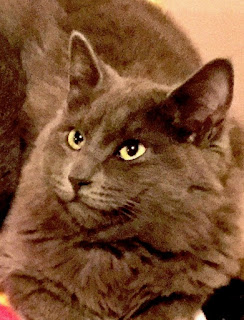Peggy and I celebrated our 49th anniversary on December 19th (she’s 69, and I’m 71), yet this is our first ever Christmas letter.
Our family now includes five indoor-only cats that range in age from 18-months to ten years. All are in good health, and all enjoy playing together, sleeping together, and bathing one another. We own hundreds of cat-related books along with cat art, and, prior to Covid, we volunteered at a cat adoption center. Peggy had originally proclaimed her intention of only having one cat, yet chose all but one of the next four. Saying no to another cat is like saying no to another potato chip.
We live in a 1955 era fixer-upper house that we bought in 1990 and spent years renovating. Many of the neighborhood’s original residents were alive when we moved in, but all have since died, and we are now the oldest people in our area.
Since Covid, we never go to stores or visit with friends. I’m not finding isolation difficult because Peggy and the cats provide sufficient companionship. On those occasions when I miss shopping or having dinner with friends, I remind myself that Covid would probably kill me, and would most certainly kill Peggy who has the occasional bout of asthma and a calcification in her right lung. Then too, our deaths would render our cats homeless. Such thoughts could keep me isolated forever.
Peggy is mostly doing well with isolation, but she has her sad moments when she reflects upon the things that she has had to give up. For instance, she had two weekly pinochle groups and two or more monthly meetings and workshops related to clothing buttons—which she started collecting in 1988. Many of these events are now being conducted on Zoom, and while some things have been lost, there have been gains. For example, the Portland Button Club recently hosted a speaker from France, and just last week, Peggy was among the 87 attendees at a meeting of the Idaho Button Society. She is now organizing her own Internet events, plus she uses the Internet in conjunction with her computer’s art program to design button displays.
For me, the worst part of Covid is that I’ve been postponing important medical and dental procedures. For example, I had two dental implants installed in my upper front teeth last Spring, but because they don’t extend above the gum-line, they are worthless until I get crowns, but by the time I had waited six months to become eligible for crowns, Covid was so widespread that I was unwilling to get them. In the meantime, eating is difficult and I often bite my lip with my remaining teeth. I’ve also developed a hernia, but I don’t plan to see a doctor until I’ve had a Covid vaccine or the pain is too great to bear. (After writing this on the 20th, I had a tooth break-off at the gumline on the 21st, but the dentist said I could postpone treatment—he suggested yet another implant—because the calcified pulp is keeping bacteria out.)
Peggy is suffering from two health problems for which treatment can’t be delayed. One is a squamous cell carcinoma on her nose (a former mountain climber, she was often exposed to high altitude sunshine), which she will have removed on January 5, in what could be a five hour surgery (the surgery is lengthy because samples of excised tissue will be tested throughout). Another problem is that, after years of unsuccessfully trying to lose two pounds, she recently dropped eight pounds, a loss that is continuing and is accompanied by pain and vomiting. In early November, her internist ordered blood tests and a CAT scan, but when they didn’t reveal anything, he prescribed an “upper GI with follow-through.” When she discovered that the contrast medium contained a migraine-causing ingredient, he substituted a “gastric emptying study.” It is to be done on December 29, and, like her surgery, it could take as long as five hours.
As the winter-long Oregon drizzle continues, Peggy and I are watching documentaries on PBS along with classic movies and TV shows from the fifties and sixties. We are also playing six or more daily games of backgammon, and I continue to be an active blogger, having no face-to-face friends who I love more than two British bloggers, Philip and Michelle, both of whom, I am extremely sad to report, are in poor health. Philip honors me with the occasional phone call, and while Michelle had suggested visiting online, she later developed a voice problem that made it impractical. I, too, am having voice problems, in my case “quivering vocal cords” for which I had just started seeing a speech therapist when Covid hit (I haven’t been back). Fortunately, I’m able to talk well enough after I’ve been up for awhile, although I fancy that I sound a bit like Katherine Hepburn.
Reading also continues to be a vital part of my life, most of my books being 100-plus year old novels by largely forgotten authors. The only author for whom I’ve sought first editions is American poet, novelist, and short story writer, Margaret Deland (1857-1945) who went from fame to obscurity during her lifetime. I also own several of her letters and photos, two biographies, and her two-volume autobiography.
Peggy, too, enjoys reading, but also spends time on her button hobby, working Sudokus, and listening to music. While I get little exercise anymore, she alternates between taking long walks one day and working out with weights the next. Marrying such an admirable woman was the best thing I ever did, yet I don’t know if we would have survived had our relationship not been helped by the fact that we are so much alike. For example, our attitudes towards money, politics, vegetarianism, religion, entertainment, clothing styles, personal safety, celebrating holidays, having five cats, house and yard decoration and maintenance, and, of late, staying isolated.
Happy Holidays,















